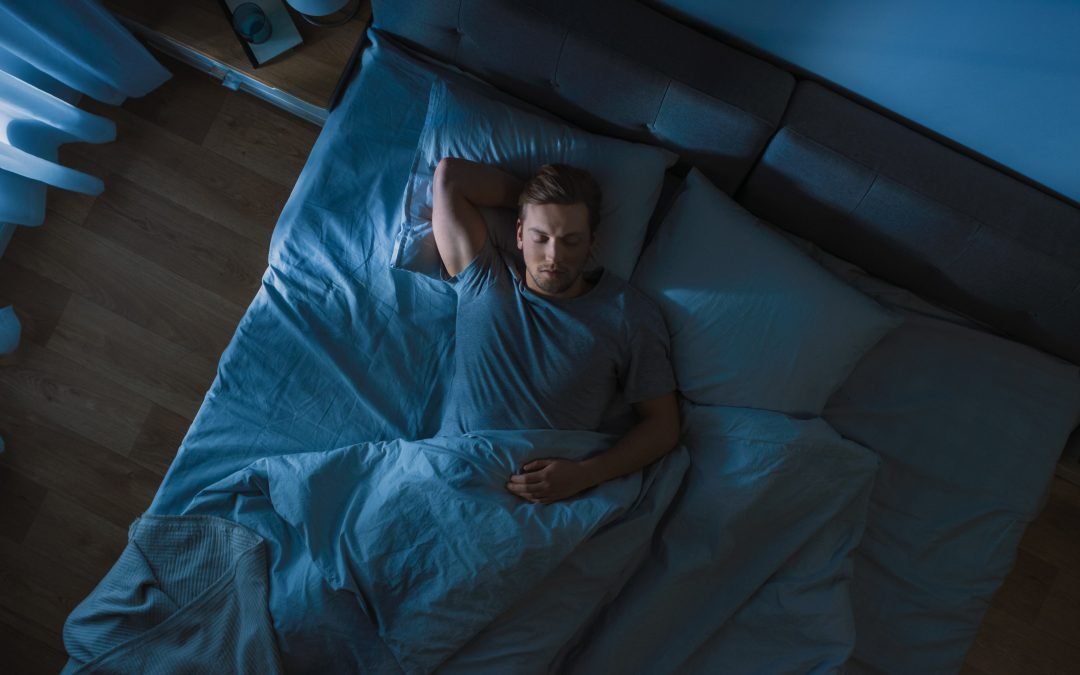As athletes and bodybuilders, we are constantly looking for the newest diet, training program or supplement that will maximize our results and give us a competitive edge against the rest. Although these are critical for gaining size and strength, we oftentimes forget that the majority of your muscle growth actually occurs when you aren’t awake.
Importance of sleep and body composition
Aside from money, sleep seems to be the one thing we could all definitely use a bit more of. Although we can occasionally get away with 4 or 5 hours of sleep, it’s not such a great idea to allow this to continue for too long since poor sleeping habits may negatively impact your cardiovascular, neuroendocrine, neuromuscular and gastro-intestinal systems, among other systemic complications, and increase susceptibility to injury and illness.[1]
General health tends to typically be of great importance to most people but even if your main goal is focused on increasing strength and muscle mass then making sure you get adequate sleep may be more important than you think. In fact, the importance of sleep in bodybuilding is so critical, no matter what training program you’re following or how well you’re eating it will not be enough to compensate for the lack of sleep.
Unfortunately, since sleep is free and not easily marketable many people shift their attention to flashy supplements, diets and training programs that promise faster results. The difference in sleeping habits may also easily be one of the main reasons why you see others at the gym progress much faster than you despite sharing similar start dates, training programs and diet.
A study published in 2010 split participants into two groups where they both underwent a two week caloric deficit but varied in hours of sleep. One group of participants slept 8.5 hours per night while the other group was only allowed 5.5 hours of sleep per night. All participants lost similar amounts of weight due to being in a caloric deficit, however, the group that was allowed only 5.5 hours of sleep every night saw a decrease of 60% more muscle mass and 55% less fat reduction compared to the group that got 8.5 hours of sleep.[2]
What the study highlights is that even in a caloric deficit, which is good for fat loss but difficult for building muscle, the amount of sleep that you get each night can further impact your body’s total fat and muscle composition.
But how much sleep is enough?
Literature has reinforced the idea that 7-8 hours of sleep per night is considered sufficient and essentially the gold-standard for most people.
According to the Sleep Foundation, everyone greatly benefits from the recommended 7-8 hours of sleep. Athletes, on the other hand, actually require approximately 9-10 hours of sleep at night to improve various physical as well as cognitive performance outcomes.[3]
This isn’t to say that sleeping 4 hours on one night will bring your 200lb 1-RM bench press down to 150lb instantly, however, you may notice some sort of decrease in your strength and endurance. This isn’t meant to frighten you especially if you already do a good job of getting sufficient  sleep throughout the rest of the week. Simply, make sure you’re not consistently getting less than 7-8 hours per night.
sleep throughout the rest of the week. Simply, make sure you’re not consistently getting less than 7-8 hours per night.
It should also be noted that habitually alternating between 4 hours of sleep one day and 12 hours of sleep the next day is not the same as sleeping 8 hours every night and will actually hinder your muscle growth.
Exercise performance and sleep
Following a night of poor sleep, your workout may seem a lot more challenging than when you actually sleep well for a few nights. It’s important to remember that perception of your workout is not the same as performance.
So the question remains, how does a night of poor or good sleep affect your performance?
A study performed with the Stanford men’s basketball team assessed their athletic performance for 4 weeks following their normal sleep schedule and then after 7 weeks of sleeping as much as possible with 10 hours per night being the minimal goal. Results showed improved sprint speed and shooting accuracy among participants.[4]
Basketball is not the only sport where players benefit from good sleeping habits. Research also shows reaction times, decision making, and accuracy improvements in athletes from all sorts of sports.
A systematic review of 19 studies examined the effects of sleep duration in 395 competitive athletes from weightlifting, judo, soccer, swimming to triathlons and many others. The biggest takeaway from this review is that increased sleep duration had either positive or neutral effects in alethic performance. Increase sleep duration did not have a negative affect on athletic performance.

A third study specifically focused on measuring the handgrip strength, max voluntary contraction strength and Wingate performance of Judo athletes following restricted sleep of 4 hours per night. Researchers found measures of power were reduced after only one night of restricted sleep.[5]
Optimal sleep is necessary for reaching peak athletic performance in sports and in bodybuilding. As you continually get insufficient sleep every night but perceive your workouts as “intense” or “heavy” it prevents you from implementing progressive overload. This fatigue will have you lifting the same weight throughout the period of your sleep deprivation hindering any room for growth.
What happens during sleep
Okay sleep it important – got it. But why?
Two very important events occur during sleep which are muscle protein synthesis (MPS) and secretion of somatotropin also known as human growth hormone.
Muscle protein synthesis is a naturally occurring response to resistance training and to some degree after increasing protein intake. In this process, the body uses amino acids to produce proteins which are responsible for the repair of muscles resulting in growth over time.
With regards to exercise and MPS, a study performed by the University of Nottingham found that workout intensities under 40% of your 1-RM (1-rep max) will not stimulate MPS. On the other hand, workouts with intensities greater than 60% of your 1-RM can double or even triple MPS.[6]
By stimulating MPS through diet and resistance training, as well as allowing it to also occur naturally during sleep, your muscles begin to recover which will maximize performance when they are fully healed.
The second event that occurs during sleep in the secretion of Human growth hormone (HGH or GH). GH is primarily secreted from the pituitary gland following intense exercise and while sleeping.[7]
In children and adolescents growth hormone plays a critical role in simulating the growth of bone and cartilage. In adults, although it won’t help you get taller since your growth plates are most likely calcified, GH increases protein synthesis and regulates blood glucose levels.[8]
Are naps okay?
Research suggests naps may be beneficial when an individual had poor sleep the night prior. Naps however should not regularly substitute adequate sleep since it will not provide the same benefits of a full 8 hours of rest.[9]
If you feel a nap is necessary, consider taking one during the morning or earlier in the afternoon compared to napping in the evening. This is to keep from experiencing delayed onset of sleep when going to bed at night.
For this reason not everyone should take naps, however, if you are someone who struggles with getting adequate sleep at night, then naps are definitely warranted.
Protein before bedtime
Sleeping for 8 to 10 hours a night, however, presents its own challenges since it provides a near fasted state environment. When fasting for long periods of time fat, sugar and protein are broken down to make glucose. Although sugars and fat are usually the first to breakdown, the amount of protein broken down from muscles is not exactly zero.
In order to decrease the catabolic effect to your muscles as much as possible, it’s encouraged to consume protein before going to sleep.
Throughout your life you’ve been told never to eat before going to sleep, and in some cases this is good advice especially if you’re susceptible to conditions such as acid reflux. Most people however tend to avoid eating late at night due over the fear of gaining weight.
This, however, happens to be a very common nutrition myth that many people believe because it makes sense.
Research demonstrates, however, weight gain largely depends on what you choose to eat rather than what time you eat. Of course, despite the nutritional content of your late light snack, if the portion becomes excessive and is consumed every night before bed, then you can probably expect some weight gain to occur.
Additionally, try to avoid consuming protein shakes high in sugars as they may complicate trying to fall asleep. Instead choose protein sources that do not contain sugars and are slow to digest. Doing this will promote MPS during the night without impairing sleep.
An article published in 2012 assessed the effects of consuming 40g of protein vs placebo prior to sleep in 16 healthy adult males. What researchers found was that MPS was successfully stimulated at higher rates in the group that consumed 40g of protein before sleeping compared to the group that were given the placebo.[10] Subjects who consumed protein were able to digest, absorb and sustain circulating amino acid levels throughout the night which promoted overnight recovery post-exercise.
How to get a good night’s rest?
- Avoid caffeine at night: Caffeine’s main effect is to keep you awake and alert. Sometimes it can cause increased feelings of agitation and can increase the release of stomach acid causing acid reflux. If your cravings for coffee are strong at night, consider trying decaffeinated coffee as an alternative. Keep in mind decaf coffee is not fully caffeine-free but is significantly removed at roughly 97%.
- Avoid oversleep/naps: As counterintuitive as this sounds, getting more sleep than what you’re accustomed to can alter your circadian rhythm. If you’re getting adequate sleep at night naps aren’t necessary. It may feel good in the beginning but you’ll definitely regret it the following night. Don’t oversleep and only nap when your sleep has been significantly reduced.
- Avoid sleeping medications: Despite their usefulness, it’s best to not become too dependent on sleeping medications since they may cause headaches, nausea and GI problems.[11]
- Enhance sleeping environment: Keeping your room dark and relatively cool with soft background music or noise can promote a good nights rest.

- Block blue light: Our circadian rhythm can shift when exposed to artificial blue light emitted from TVs and cell phones at night. Research shows out of all light, blue light increases wakefulness the most since it decreases melatonin production which is a hormone responsible for regulating sleep-wake cycles.[12][13] Although there is no evidence showing blue-light blocking glasses help prevent progression of macular degeneration, there is evidence they can promote better quality sleep.[14]
- Melatonin: Unlike other prescription and OTC sleep medications, melatonin is a hormone naturally produced in
 your brain and is responsible for regulating your circadian rhythm. Production is responsive to dark environments and is relatively safe to use.[15] Keep in mind some people are responsive to low doses of melatonin while others are responsive at higher doses or simply not responsive at all. Children should avoid melatonin while adults are recommended anywhere from 1-10mg. As previously stated melatonin is safe in the recommended doses, however evidence seems to suggest doses near 30mg may be harmful.[16]
your brain and is responsible for regulating your circadian rhythm. Production is responsive to dark environments and is relatively safe to use.[15] Keep in mind some people are responsive to low doses of melatonin while others are responsive at higher doses or simply not responsive at all. Children should avoid melatonin while adults are recommended anywhere from 1-10mg. As previously stated melatonin is safe in the recommended doses, however evidence seems to suggest doses near 30mg may be harmful.[16]
PHF on the subject
Again it is very critical to understand, no diet or training program will substitute your body’s natural recovery process that occurs when you sleep.
Understanding the importance of sleep is a whole different story than actually getting more sleep. Like most things in bodybuilding, knowledge is nothing without practice.
If you’re looking to improve your sleeping habits consider setting a routine where you avoid alcohol and caffeine before sleeping as well as establishing restrictions on late night electronic usage and incorporate sleeping aids such as melatonin and blue-light blocking glasses.
It’s understandable that establishing a sleeping schedule is often set aside due to individual circumstances such as school, work, or other personal factors getting in the way. For others, sleeping 9-10 hours a day can be perceived as time wasted that could otherwise be used to be productive. Whatever the reason may be, the importance of sleep remains the same. Get some shut eye to maximize your gains potential!

